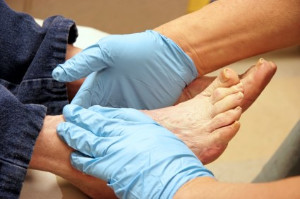 Foot ulcers are one of the greatest threats a diabetic can experience. While small cuts on the foot are generally not a problem for most people, for diabetics they can be very serious. Many diabetics experience neuropathy, or nerve damage, and cannot feel when they have a wound on their leg. Diabetes can also lead to poor blood circulation, which can make it harder for wounds to heal properly. Untreated ulcers have the potential to become infected. In extremely severe cases of infection, amputation may be necessary. If you are diabetic and have a foot wound, it is recommended to see a podiatrist immediately. A podiatrist will examine the wound and properly clean it. If the ulcer is infected but the infection is not serious, antibiotics will most likely be prescribed. Finally, the podiatrist can provide orthotics or other devices to keep weight off the wound. The doctor will also want to have another checkup to make sure that the wound begins to heal. However, if the infection is severe, then amputation or limb salvage may be necessary. Ultimately, the best way to prevent amputation is through daily foot inspections of any abnormalities and monitoring your diabetes closely.
Foot ulcers are one of the greatest threats a diabetic can experience. While small cuts on the foot are generally not a problem for most people, for diabetics they can be very serious. Many diabetics experience neuropathy, or nerve damage, and cannot feel when they have a wound on their leg. Diabetes can also lead to poor blood circulation, which can make it harder for wounds to heal properly. Untreated ulcers have the potential to become infected. In extremely severe cases of infection, amputation may be necessary. If you are diabetic and have a foot wound, it is recommended to see a podiatrist immediately. A podiatrist will examine the wound and properly clean it. If the ulcer is infected but the infection is not serious, antibiotics will most likely be prescribed. Finally, the podiatrist can provide orthotics or other devices to keep weight off the wound. The doctor will also want to have another checkup to make sure that the wound begins to heal. However, if the infection is severe, then amputation or limb salvage may be necessary. Ultimately, the best way to prevent amputation is through daily foot inspections of any abnormalities and monitoring your diabetes closely.
Diabetic foot care is important in preventing foot ailments such as ulcers. If you are suffering from diabetes or have any other concerns about your feet, contact one of our podiatrists from Sutera and Jones Surgical Podiatry. Our doctors can provide the care you need to keep you pain-free and on your feet.
Diabetic Foot Care
Diabetes affects millions of people every year. The condition can damage blood vessels in many parts of the body, especially the feet. Because of this, taking care of your feet is essential if you have diabetes, and having a podiatrist help monitor your foot health is highly recommended.
The Importance of Caring for Your Feet
- Routinely inspect your feet for bruises or sores.
- Wear socks that fit your feet comfortably.
- Wear comfortable shoes that provide adequate support.
Patients with diabetes should have their doctor monitor their blood levels, as blood sugar levels play such a huge role in diabetic care. Monitoring these levels on a regular basis is highly advised.
It is always best to inform your healthcare professional of any concerns you may have regarding your feet, especially for diabetic patients. Early treatment and routine foot examinations are keys to maintaining proper health, especially because severe complications can arise if proper treatment is not applied.
If you have any questions please feel free to contact one of our offices located in Media, Glen Mills, Riddle Memorial Hospital, and Concordville, PA . We offer the newest diagnostic and treatment technologies for all your foot and ankle needs.
